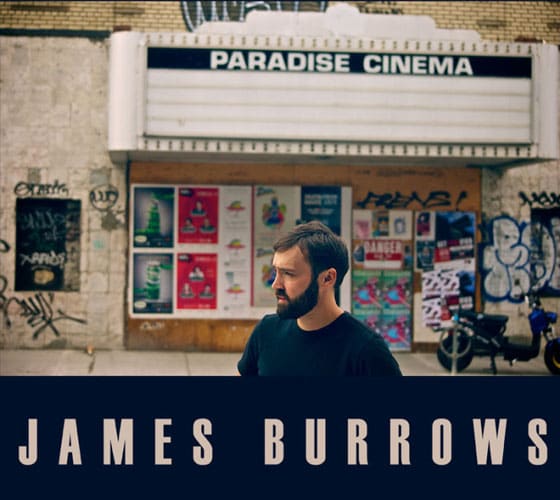James Burrows' influences are more than apparent on his new LP, Paradise Cinema. The Toronto singer songwriter sounds like the King of rock'n'roll incarnate on "Cadillac," the album's second track, thanks to his drawling delivery and a rockabilly backbeat that sounds like a long lost Sun Records B-side. But Burrows immediately takes an abrupt turn to a more modern sound on the next track, "Somewhere in California," which finds Burrows singing with a braying voice akin to Bob Seger, leaving him all but unrecognisable from his turn on the preceding "Cadillac." This is followed by four songs— "Factories Made of Steel," "Through the Night," "Houses," and "Built On Tides"— on which Burrows sings with a hoarse earnestness not unlike Bruce Springsteen circa Darkness on the Edge of Town, an affectation that helped by the climactic, E Street-style keyboard climax midway through "Factories."
Burrows then closes the album with "Early December," a gently strummed ballad on which, for the first time, the listener will be compelled to stop playing "spot the influence" and instead marvel at the songwriter's mastery of melancholy, as Burrows sings in a tone that's palpably weary. It's a heart-wrenching song that feels entirely original, and for that reason, out of place on an album that's otherwise so deeply indebted to the songwriter's musical heroes.
His homages to those forebears are expertly executed, but Paradise Cinema would have more than benefitted from at least a few more numbers that were distinctively Burrows' own. Or, at the very least, he shouldn't have focused so much on the Springsteen-esque fare, and instead recorded an entire album of rockabilly revivals like "Cadillac." That would make for a far more original listen than the admirable, but pretty derivative Paradise Cinema.
(Independent)Burrows then closes the album with "Early December," a gently strummed ballad on which, for the first time, the listener will be compelled to stop playing "spot the influence" and instead marvel at the songwriter's mastery of melancholy, as Burrows sings in a tone that's palpably weary. It's a heart-wrenching song that feels entirely original, and for that reason, out of place on an album that's otherwise so deeply indebted to the songwriter's musical heroes.
His homages to those forebears are expertly executed, but Paradise Cinema would have more than benefitted from at least a few more numbers that were distinctively Burrows' own. Or, at the very least, he shouldn't have focused so much on the Springsteen-esque fare, and instead recorded an entire album of rockabilly revivals like "Cadillac." That would make for a far more original listen than the admirable, but pretty derivative Paradise Cinema.
